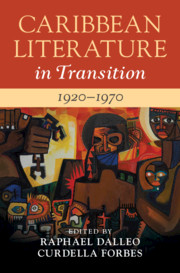Book contents
- Caribbean Literature in Transition, 1920–1970
- Caribbean Literature in Transition
- Caribbean Literature in Transition, 1920–1970
- Copyright page
- Contents
- Figure
- Contributors
- Introduction
- Part I Literary and Generic Transitions
- Part II Cultural and Political Transitions
- Part III The Caribbean Region in Transition
- Chapter 12 A Moving Centre
- Chapter 13 Canadian Routes
- Chapter 14 New Empires
- Chapter 15 Africa and the Caribbean
- Chapter 16 Cross-Caribbean Dialogues I
- Chapter 17 Cross-Caribbean Dialogues II
- Part IV Critical Transitions
- Bibliography
- Index
Chapter 17 - Cross-Caribbean Dialogues II
Francophone
from Part III - The Caribbean Region in Transition
Published online by Cambridge University Press: 16 December 2020
- Caribbean Literature in Transition, 1920–1970
- Caribbean Literature in Transition
- Caribbean Literature in Transition, 1920–1970
- Copyright page
- Contents
- Figure
- Contributors
- Introduction
- Part I Literary and Generic Transitions
- Part II Cultural and Political Transitions
- Part III The Caribbean Region in Transition
- Chapter 12 A Moving Centre
- Chapter 13 Canadian Routes
- Chapter 14 New Empires
- Chapter 15 Africa and the Caribbean
- Chapter 16 Cross-Caribbean Dialogues I
- Chapter 17 Cross-Caribbean Dialogues II
- Part IV Critical Transitions
- Bibliography
- Index
Summary
During the decolonization era in the Caribbean, writers from throughout the region shaped visions of nationalism and anticolonialism through engaging with francophone Caribbean history and culture. Haiti in particular played a major symbolic role. Looking back to the Haitian Revolution offered anticolonial writers ways of thinking about challenging imperialism as well as lessons for independence. At the same time, Haitian indigénisme and the versions of Haitian culture and religion that circulated internationally during the US occupation inspired a reconsideration of the Africanness of Caribbean culture. This chapter will also make comparisons to the francophone Negritude movement centred especially in Martinique and its revaluation of Africa through Haiti. Writers considered include C. L. R. James, Derek Walcott, Eric Walrond, Kamau Brathwaite, George Lamming, Jean Rhys, Alejo Carpentier, Édouard Glissant, and Aimé Césaire.
Information
- Type
- Chapter
- Information
- Caribbean Literature in Transition, 1920–1970 , pp. 276 - 290Publisher: Cambridge University PressPrint publication year: 2021
